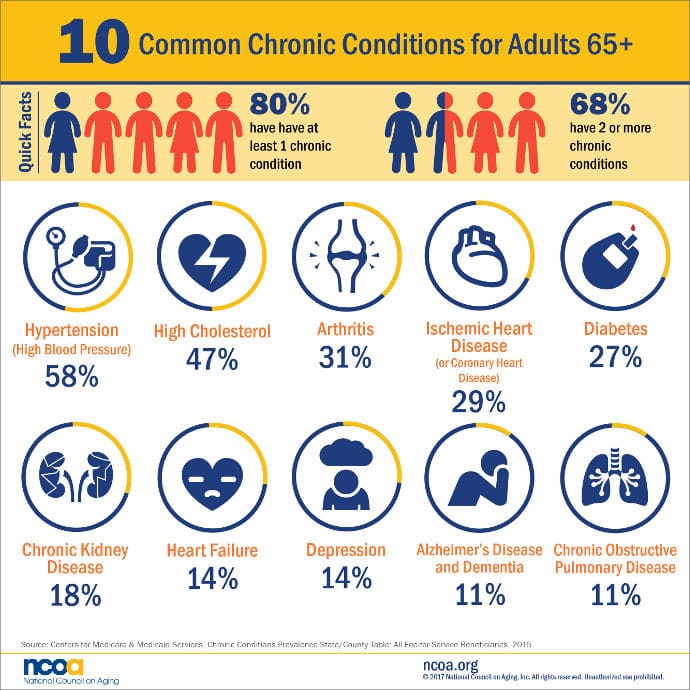As we age, chronic diseases often become a part of life, but they don’t have to define it. From arthritis to heart disease, these conditions affect millions of seniors, yet many can be prevented or managed with the proper tools. At DailyCaring, we know how overwhelming it can feel to navigate multiple diagnoses, medications, and lifestyle changes.

That’s why we’ve broken down the 10 most common chronic diseases in older adults, offering practical prevention tips and management strategies to help your loved one stay healthier longer. Whether you’re concerned about diabetes, osteoporosis, or dementia, this guide empowers you with actionable steps to improve quality of life – because aging well starts with understanding the risks and taking control.
Understanding Today's Chronic Health Conditions Affecting Seniors
80% of seniors have at least one chronic health condition, and 68% have two or more.
Despite these statistics, older adults can maximize health and quality of life by managing symptoms from existing health conditions and reducing the risk of developing other conditions.
The National Council on Aging has put together a list of the top 10 most common chronic diseases in older adults on Medicare, along with tips for preventing or managing them.
To help your older adult stay as healthy as possible, we share NCOA’s helpful infographic, which highlights key information as well as prevention and management tips for each of the 10 chronic conditions.

1. High Blood Pressure (hypertension) Affects 58% of Seniors
High blood pressure (also known as HBP or hypertension) is a serious condition that affects 58% of seniors on Medicare.
It’s often called the “silent killer” because it has no symptoms.
But it damages blood vessels and increases the risk of severe (and sometimes fatal) conditions like stroke and heart attack.
Prevent or reduce high blood pressure by:
- Maintaining a healthy weight
- Reducing stress
- Limiting salt and alcohol
- Exercising regularly (daily, if possible)
- Check blood pressure regularly to monitor progress or detect pre-hypertension
2. High Cholesterol Affects 47% of Seniors
Nearly half of all seniors on Medicare were treated for high cholesterol. When the body has too many bad fats, arteries get clogged, causing heart disease.
Prevent or manage high cholesterol by:
- Quitting smoking
- Reducing the amount of alcohol consumed
- Staying active and/or exercising regularly
- Maintaining a healthy weight
- Eating less saturated and trans fats

3. Arthritis Affects 31% of Seniors
Osteoarthritis (OA) is the most common form of arthritis. It’s a joint disease in which the joint cartilage breaks down over time.
That causes swelling and inflammation, which leads to pain and stiffness.
Some people dismiss arthritis as occasional aches or stiffness, but chronic arthritis pain can be so severe that seniors are forced to make unwanted lifestyle changes.
Delay arthritis onset or manage symptoms by:
- Exercising regularly, ideally 5 times/week for 30 minutes each time – this improves function and decreases pain
- Maintaining a healthy weight – losing just one pound can remove 4 pounds of pressure from the knees
- Being careful to avoid joint injuries
- Not smoking
4. Coronary Heart Disease Affects 29% of Seniors
Coronary heart disease (ischemic heart disease) occurs when plaque builds up in the arteries leading to the heart.
That decreases the amount of blood going to the heart and can cause additional complications like blood clots, angina, or a heart attack.
Prevent or manage coronary heart disease by:
- Limiting saturated and trans fats, sugar, and salt
- Sleeping 7-8 hours each night
- Reducing stress
- Exercising regularly
- Not smoking
- Talk to the doctor about managing major risk factors, like high cholesterol and high blood pressure
5. Diabetes Affects 27% of Seniors
When someone has diabetes, the glucose level in their blood (blood sugar) is too high. This can happen when the body doesn’t make enough insulin.
When there isn’t enough insulin, glucose doesn’t get moved into the body's cells. Instead, it builds up in the blood and causes high blood sugar.
Over time, high blood sugar seriously damages the eyes, kidneys, nerves, heart, gums, teeth, and blood vessels.
This leads to health conditions like heart disease, stroke, blindness, kidney disease, nerve problems, gum infections, and amputation.
People with diabetes are also more likely to have heart disease or a stroke, and at an earlier age.
Prevent or manage diabetes by:
- Eating a healthy diet and talking to the doctor about alcohol consumption
- Exercising regularly – 30 minutes, 5 times/week to keep blood sugar levels in check and control weight
- Losing 5-7% of body weight if diagnosed with pre-diabetes.”
Did you know 80% of older adults have at least one chronic condition (CDC)? Small changes today can make a big difference tomorrow.
6. Chronic Kidney Disease (CKD) Affects 18% of Seniors
Chronic kidney disease causes a slow decline in kidney function over time. That causes an increased risk of heart disease or kidney failure.
Prevent CKD or reduce symptoms by:
- Reducing the risk of diabetes and high blood pressure, or managing symptoms – essential because these are the two most significant risk factors for kidney damage
- Staying current on screenings for early detection and treatment
- Taking prescriptions to reduce and manage symptoms
7. Heart Failure Affects 14% of Seniors
Heart failure occurs when the heart becomes weakened and cannot pump as efficiently, supplying insufficient blood and oxygen to the entire body.
This can cause changes in the heart muscle that cause fatigue, light-headedness, nausea, confusion, or decreased appetite.
Prevent or manage heart failure by:
- Decreasing risk for coronary heart disease and high blood pressure
8. Depression Affects 14% of Seniors
Depression is a treatable medical condition that is not a normal part of aging.
It can cause persistent feelings of sadness, emotional numbness, anxiety, sleep problems, concentration and memory problems, changes in appetite or weight, a loss of interest in activities, and more.
Prevent or manage depression by:
- Staying connected with people
- Eating a healthy diet
- Limiting alcohol, caffeine, artificial sweeteners, and highly processed foods
- Exercising regularly
- Talking to the doctor about treatment options like therapy or medications
- See additional ways to help seniors with depression
If you’re concerned about suicide, call the National Suicide Prevention Lifeline at 1-800-273-8255.
9. Alzheimer’s Disease and Dementia Affect 11% of Seniors
Alzheimer's disease is a form of dementia. It’s the most common type and accounts for 60 – 80% of all dementia cases.
Dementia is an umbrella term for a collection of cognitive symptoms.
It’s caused when the brain is damaged by diseases like Alzheimer's, many small strokes, or brain injuries.
Alzheimer’s and other dementias cause memory loss and difficulty thinking or problem-solving that interfere with everyday life.
Reduce the risk of dementia by:
- Exercising regularly, both the body and the brain
- Staying engaged in life and maintaining social connections
- Getting good quality sleep
- Eating a healthy diet
10. Chronic Obstructive Pulmonary Disease (COPD) Affects 11% of Seniors
COPD is a disease that includes emphysema and chronic bronchitis. It makes breathing hard and causes shortness of breath, coughing, and chest tightness.
Prevent COPD or manage symptoms by:
- Quitting smoking and avoiding secondhand smoke, chemical fumes, and dust
- Taking prescribed treatments
- Getting flu and pneumonia vaccines
- Remaining as active as possible
Next Step See the 10 most common chronic diseases in older adults at National Council on Aging
Recommended for you:
- 10 Ways to Improve Health in Seniors Living with High Blood Pressure
- Why Seniors Need a Health Advocate: 7 Health Benefits
- What Does a Geriatric Doctor Do? How Seniors Benefit From a Specialist
About the Author

Connie Chow
Connie was a hands-on caregiver for her grandmother for 20 years. (Grandma made it to 101 years old!) She knows how challenging, overwhelming, and all-consuming caring for an older adult can be. She also knows how important support is — especially in the form of practical solutions, valuable resources, and self-care tips.




